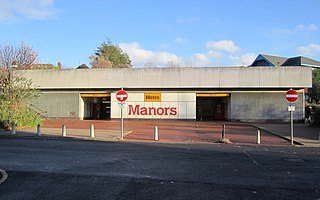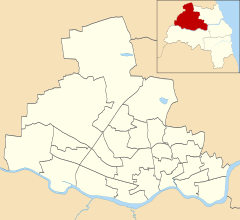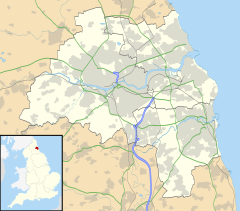
The Tyne and Wear Metro is an overground and underground light rail rapid transit system serving Newcastle upon Tyne, Gateshead, North Tyneside, South Tyneside, and the City of Sunderland. It has been described as the "first modern light rail system in the United Kingdom". The system is currently both owned and operated by the Tyne and Wear Passenger Transport Executive (Nexus), thus is fully under public ownership and operation.

Newcastle station is a railway station in Newcastle, Tyne and Wear, England, United Kingdom. It is located on the East Coast Main Line, around 268 miles (432 km) north of London King's Cross. It is the primary national rail station serving Newcastle upon Tyne and is an interchange for local services provided by the Tyne and Wear Metro network whose Central Station is situated beneath the national rail station. It is the busiest station in Tyne & Wear, as well as the busiest in North East England.

The North Tyneside Steam Railway and Stephenson Steam Railway are visitor attractions in North Shields, North East England. The museum and railway workshops share a building on Middle Engine Lane adjacent to the Silverlink Retail Park. The railway is a standard gauge line, running south for 2 miles (3.2 km) from the museum to Percy Main. The railway is operated by the North Tyneside Steam Railway Association (NTSRA). The museum is managed by Tyne and Wear Archives and Museums on behalf of North Tyneside Council.

West Jesmond is a Tyne and Wear Metro station, and former British Rail station, serving the suburb of Jesmond, Newcastle upon Tyne in Tyne and Wear, England. It was originally opened on 1 December 1900 by the North Eastern Railway, and became part of the Tyne and Wear Metro on 11 August 1980.

South Gosforth is a Tyne and Wear Metro station, and former British Rail station, serving the suburb of Gosforth, Newcastle upon Tyne in Tyne and Wear, England. It originally opened on 27 June 1864, as part of the Blyth and Tyne Railway, and became part of the Tyne and Wear Metro on 11 August 1980.

Longbenton is a Tyne and Wear Metro station, and former British Rail station, in the English metropolitan county of Tyne and Wear. It was originally opened on 14 July 1947 by the North Eastern Railway, and became part of the Tyne and Wear Metro on 11 August 1980. It should not be confused with a previous station, on the site of the current Four Lane Ends Metro station, that opened in 1864, closed in 1871, and was variously called Benton, Long Benton and Longbenton.

Four Lane Ends is a Tyne and Wear Metro station and bus interchange in the borough of North Tyneside in the English metropolitan county of Tyne and Wear. The station opened on 11 August 1980, but it is situated on the site of a previous station that opened in 1864, closed in 1871, and was variously called Benton, Long Benton and Longbenton.

Heaton is a district and suburb in the city of Newcastle upon Tyne, in Tyne and Wear, England, two miles east of the city centre. It is bordered by the neighbouring areas of Walkergate to the east, Jesmond to the north west, Byker to the south, and Sandyford to the west. The name Heaton means high town, referring to the area "being situated on hills above the Ouseburn, a tributary of the River Tyne." The area is divided into South Heaton, and High Heaton, representing the north, respectively. For city council elections, the area is split between three wards: Heaton, Manor Park and Ouseburn. Until 1974 it was in Northumberland.

The Tyneside Electrics were the suburban railways on Tyneside that the North Eastern Railway and the London and North Eastern Railway electrified using the third rail system. The North Tyneside Loop was electrified from 1904 onwards and formed one of the earliest suburban electric networks; the South Tyneside line to South Shields via Pelaw was electrified in March 1938. British Railways converted these lines to diesel operation in the 1960s: the line to South Shields in January 1963 and the North Tyneside lines in June 1967 when the electrical supply infrastructure and the rolling stock had become life expired. In addition, the system was losing passengers and suffering from costly vandalism. Since the late 1970s, much of the system has been converted to form the Tyne and Wear Metro.
The North Tyneside Loop refers to the railway lines in North Tyneside from Newcastle upon Tyne via Wallsend, North Shields, Whitley Bay, Backworth, Benton and South Gosforth back to Newcastle. Since the 1980s, it has formed part of the Tyne and Wear Metro, albeit in modified form.
The Blyth and Tyne Railway was a railway company in Northumberland, England, incorporated by act of Parliament on 30 June 1852. It was created to unify the various private railways and waggonways built to carry coal from the Northumberland coalfield to Blyth and the River Tyne, which it took control of on 1 January 1853. Over time, the railway expanded its network to reach Morpeth (1857/8), North Seaton (1859), Tynemouth (1860/1), Newcastle upon Tyne (1864), and finally Newbiggin-by-the-Sea (1872). It became part of the much larger North Eastern Railway in 1874.

Manors is a railway station on the East Coast Main Line, which runs between London King's Cross and Edinburgh Waverley. The station serves the Quayside and Shieldfield areas of the city of Newcastle upon Tyne in Tyne and Wear, England. It is owned by Network Rail and managed by Northern Trains. The Metro station of the same name is not directly connected, and located a short walk away.

Jesmond is a Tyne and Wear Metro station, serving the suburb of Jesmond, Newcastle upon Tyne in Tyne and Wear, England. It joined the network on 11 August 1980, following the opening of the first phase of the network, between Haymarket and Tynemouth via Four Lane Ends.

Manors is a Tyne and Wear Metro station, serving the Shieldfield area in Newcastle upon Tyne. It joined the network on 14 November 1982, following the opening of the fourth phase of the network, between Tynemouth and St James via Wallsend. The station is located near to Manors National Rail station, which is on the East Coast Main Line. However, the stations are not directly connected.

Whitley Bay is a Tyne and Wear Metro station, serving the coastal town of Whitley Bay, North Tyneside in Tyne and Wear, England. It joined the network on 11 August 1980, following the opening of the first phase of the network, between Haymarket and Tynemouth via Four Lane Ends.

Newcastle City Centre is the city centre district of Newcastle upon Tyne, England. It is the historical heart of the city and serves as the main cultural and commercial centre of the North East England region. The city centre forms the core of the Tyneside conurbation.

Jesmond is a suburb of Newcastle upon Tyne, Tyne and Wear, England, situated north of the city centre and to the east of the Town Moor. Jesmond is considered to be one of the most affluent suburbs of Newcastle upon Tyne, with higher average house prices than most other areas of the city.

Tyne and Wear is a metropolitan area covering the cities of Newcastle upon Tyne and Sunderland, as well as North and South Tyneside, Gateshead and Washington.

South Gosforth Traction Maintenance Depot is a vehicle cleaning, maintenance and stabling facility used by the Tyne and Wear Metro, located in Gosforth, Newcastle upon Tyne in Tyne and Wear, England.



















